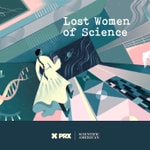Lost Women of Science – Détails, épisodes et analyse
Détails du podcast
Informations techniques et générales issues du flux RSS du podcast.


For every Marie Curie or Rosalind Franklin whose story has been told, hundreds of female scientists remain unknown to the public at large. In this series, we illuminate the lives and work of a diverse array of groundbreaking scientists who, because of time, place and gender, have gone largely unrecognized. Each season we focus on a different scientist, putting her narrative into context, explaining not just the science but also the social and historical conditions in which she lived and worked. We also bring these stories to the present, painting a full picture of how her work endures.
Classements récents
Dernières positions dans les classements Apple Podcasts et Spotify.
Apple Podcasts
🇨🇦 Canada - science
14/08/2025#48🇨🇦 Canada - science
13/08/2025#65🇫🇷 France - science
08/08/2025#86🇬🇧 Grande Bretagne - science
24/06/2025#65🇬🇧 Grande Bretagne - science
23/06/2025#52🇬🇧 Grande Bretagne - science
22/06/2025#46🇬🇧 Grande Bretagne - science
21/06/2025#67🇺🇸 États-Unis - science
20/06/2025#99🇺🇸 États-Unis - science
18/06/2025#94🇺🇸 États-Unis - science
17/06/2025#70
Spotify
Aucun classement récent disponible
Liens partagés entre épisodes et podcasts
Liens présents dans les descriptions d'épisodes et autres podcasts les utilisant également.
See all- https://dovetail.prx.org/ad-choices
10261 partages
- https://www.usda.gov/
39 partages
- https://carlzimmer.com/
23 partages
Qualité et score du flux RSS
Évaluation technique de la qualité et de la structure du flux RSS.
See allScore global : 74%
Historique des publications
Répartition mensuelle des publications d'épisodes au fil des années.
Trailer: The Devil in the Details
jeudi 29 août 2024 • Durée 01:43
In the 1950s, a German drug company developed a new sedative that was supposed to be 100% safe: thalidomide. So safe, in fact, it was promoted to women as a treatment for morning sickness. It quickly became a bestseller. But in the early 1960s, shocking news started coming out of Europe. Thousands of babies were being born with shortened arms and legs, heart defects, and other serious problems. Many died.
In the United States things were different, thanks to one principled, strong-minded skeptic who joined the Federal Drug Administration in 1960 as a medical reviewer. One of her first assignments was to review the approval application of that very wonder drug, thalidomide. But the application was, to her mind, flawed.
Dr. Frances Oldham Kelsey was a physician, a pharmacologist, and a nitpicker who refused to be intimidated by big pharma.
Starting in September, a new five-part series from Lost Women of Science: The Devil in the Details, the story of Frances Oldham Kelsey, The Doctor Who Said No To Thalidomide.
Lost Women of Science Conversations: Writing for Their Lives
jeudi 22 août 2024 • Durée 28:54
In the 1920s, when newspapers and magazines started to showcase stories about science, many of the early science journalists were women, working alongside their male colleagues despite less pay and outright misogyny. They were often single or divorced and, as Marcel Chotkowski LaFollette explains, writing for their lives. From Emma Reh, who traveled to Mexico to get a divorce and ended up trekking to archeological digs on horseback, to Jane Stafford, who took on taboo topics like sex and sexually transmitted diseases, they started a tradition of explaining science to non-scientists, accurately and with flair.
Revisiting the Pathologist in the Basement
jeudi 9 mai 2024 • Durée 31:07
A few important things have happened in the three years since we first aired The Pathologist in the Basement, the story of Dr. Dorothy Andersen, the first to identify cystic fibrosis. It’s safe to say that Dr. Anderson is now a little less lost. In Episode 1, Dr. Andersen sleuths her way to the discovery of cystic fibrosis, a fatal disease that affects the lungs, the pancreas, and a host of other organs. So, who was Dorothy Andersen, and how did she come to make this seminal medical contribution?
Learn about your ad choices: dovetail.prx.org/ad-choicesLost Women of Science Conversations: Mathematics for Ladies
jeudi 2 mai 2024 • Durée 26:04
When poet Jessy Randall started researching the lives of female scientists she became angry. And we certainly can relate here at Lost Women of Science. So many women made important discoveries but received little recognition. In this episode of Lost Women of Science Conversations, Randall talks to Carol Sutton Lewis about Mathematics for Ladies: Poems on Women in Science, the collection of poems born of that anger. They discuss what it means to be the first in a field, the ethics of poetic license, and the importance of female role models in STEM. Randall’s poems are about some of the women we’ve featured in our podcast, including the first Black female doctor, Rebecca Lee Crumpler, and the physicist Lise Meitner.
Learn about your ad choices: dovetail.prx.org/ad-choicesElizabeth Bates and the Search for the Roots of Human Language
jeudi 25 avril 2024 • Durée 37:14
“We were each put on earth to torment the other,” says cognitive scientist Steven Pinker of Elizabeth Bates, a psychologist who challenged the prevailing theory about how humans acquire language. Bates believed that language emerges from interactions between our brains and our environments, and that we do not have an innate language capacity. To many, that sounds like an innocuous statement. But in making these claims, Bates challenged formidable linguists like Pinker and Noam Chomsky, placing herself at the center of a heated debate that remains unresolved half a century later.
Learn about your ad choices: dovetail.prx.org/ad-choicesThe Theoretical Physicist Who Worked With J. Robert Oppenheimer at the Dawn of the Nuclear Age
jeudi 18 avril 2024 • Durée 30:33
Melba Phillips, who grew up on a farm in Indiana at the turn of the 20th century, was one of J. Robert Oppenheimer’s first graduate students at the University of California, Berkeley. Together they discovered the Oppenheimer-Phillips Process, which explained a particular kind of nuclear reaction. In this episode, we explain what that is, with a little help from generative AI. Phillips did not follow Oppenheimer to Los Alamos, and was vocal in her opposition to nuclear weapons. During the McCarthy era, she lost her teaching job, and did not return to academia until 1957. In 1962, then in her mid-fifties, she finally became a full professor at the University of Chicago.
Learn about your ad choices: dovetail.prx.org/ad-choicesBest Of: The Highest of All Ceilings, Astronomer Cecilia Payne-Gaposchkin
jeudi 11 avril 2024 • Durée 29:49
Cecilia Payne-Gaposchkin was in her early 20s when she figured out what the stars are made of. Both she and her groundbreaking findings were ahead of their time. Continuing the legacy of women working at the Harvard College Observatory, Cecilia charted the way for a generation of female astronomers to come. This Best Of episode of Lost Women of Science follows Cecilia’s journey of discovery, journals her drive and determination against all odds, and takes you to the Harvard College Observatory itself to walk in Cecilia’s footsteps.
Learn about your ad choices: dovetail.prx.org/ad-choicesThe Victorian Woman Who Chased Eclipses
jeudi 4 avril 2024 • Durée 30:31
The year is 1897 and Annie Maunder, an amateur astronomer, is boarding a steamship bound for India from England. Her goal: to photograph a total solar eclipse. Like the many people whose gaze will turn upwards in North America on April 8, Maunder was fascinated by the secrets of the sun and was determined to travel the globe and unlock them. She understood that the few minutes of darkness during a solar eclipse presented a special opportunity to explore the nature of the sun. Her observations led to our greater understanding of how the sun affects the earth, but like so many early female scientists, her contributions and achievements have been forgotten.
Learn about your ad choices: dovetail.prx.org/ad-choicesLost Women of Science Conversations: Mischievous Creatures
jeudi 28 mars 2024 • Durée 25:39
In this episode of Lost Women of Science Conversations, Michelle Nijhuis talks to historian Catherine McNeur about how she rediscovered the lives and work of Elizabeth and Margaretta Morris, two natural scientists who made significant contributions to botany and entomology in the mid-19th Century. Elizabeth collected rare plant species and sent them to institutions around the world, and Margaretta not only discovered new insects but also helped farmers combat the pests that were devastating their fields. Nevertheless, by both design and accident, these women were lost to history. McNeur tells us how that happened and how, piece by piece, she recovered their stories.
Learn about your ad choices: dovetail.prx.org/ad-choicesThe Cognitive Scientist Who Unraveled the Mysteries of Language
jeudi 21 mars 2024 • Durée 16:32
While working at the Salk Institute in California, Ursula Bellugi discovered that sign language was made up of specific building blocks that were assembled following strict rules, much like in spoken language. Her subsequent discoveries about the complexities of sign language led both to linguistic breakthroughs and to changes in the way deaf people felt about signing. Bellugi demonstrated that sign language is as rich and complex as any spoken language. Her work deepened our understanding of what it means to communicate as humans.
Learn about your ad choices: dovetail.prx.org/ad-choices








